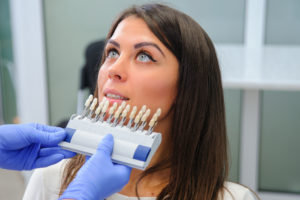A s the population grows older dental implants are being used to replace lost teeth. New technologies that make the procedures safer, easier and more affordable are meeting a booming demand for dental implants. In fact, according to the American Academy of Implant Dentistry, the number of people with dental implants is growing by a half a million a year. 2018 has brought some special new trends in the dental industry, and anyone who is considering getting their smile back will want to stay on top of the latest developments.
s the population grows older dental implants are being used to replace lost teeth. New technologies that make the procedures safer, easier and more affordable are meeting a booming demand for dental implants. In fact, according to the American Academy of Implant Dentistry, the number of people with dental implants is growing by a half a million a year. 2018 has brought some special new trends in the dental industry, and anyone who is considering getting their smile back will want to stay on top of the latest developments.
Dental assistants can learn how to support a dentist in properly designing, molding and creating dental implants. This important skill can be learned during a dental assisting program at a local vocational school. With the growing need for dentists, there will be an equal demand for highly trained dental assistants, to allow the dentist to focus on more complex dental care. According to the U.S. Bureau of Labor Statistics, employment of dental assistants is projected to grow 19 percent from 2016 to 2026.
What Are Dental Implants?
Dental implants are the closest you can get to natural teeth, according to the American Academy of Implant Dentistry. Dental implants are metal posts or frames that are surgically added to the gums of a person missing teeth. These dental implants fuse to a patient’s jawbone and provide support for the artificial teeth or crowns.
Alternatives to Dental Implants
If a patient is considering getting dental implants, they should also consider bridges and dentures. Bridges and dentures can be removed from the mouth however they may slip out of place. Dental implants do not move around in the mouth and don’t need to be removed. To receive dental implants, the patient must have healthy gums and enough bone in the jawbone to support the implant. If the gums are not healthy, bridges and dentures may be a better fit.
There are some great advances in dental implant technologies. These advances include mini-implants, 3D dental implant printing and the designation of Dental Implant Specialist.
Mini-Implants
Mini Dental implants are becoming more widely used as dental implant usage grows. Not only are they less expensive than traditional dental implants (often costing half the price), but they can be done in less time. The are also less invasive than traditional dental implants. Made from a titanium “root” and a retaining fixture attached to the denture, mini implants are stable, long lasting alternatives to the traditional bridge denture implant systems.
With mini implants a smaller denture is used, patients retain more of their natural palate, which leads to a better experience in terms of comfort and sensation than traditionally larger dental implants.
3D Dental Implant Printing
Rapid advances in 3D printing have now made it possible to manufacture high quality custom dental implants on demand, something simply not possible just a couple of years ago. State of the art 3D printers are now able to provide dental technicians with brand new implants within 24 hours of sending in an CAD file.
Startup firms that specialize in providing these 3D systems are gaining ground in the medical and dental industries. As 3D technology becomes more accessible and easier to operate, we may start to see 3D printers incorporated into larger dental practices. In fact, according to Dental Economics Magazine, 2018 will be the year that the 3D printer starts it’s inevitable takeover of the handmade implants traditionally done be dentists, and finds its place in the heart of the dental practice, according to Dental Economics Magazine.
Dental Implant Specialists
As the demand for and availability of dental implants continues to grow, so will the number of dentists who specialize in the procedure. The American Academy of Implant Dentistry reports that the U.S. Court of Appeals case in 2017 just granted dentists the right to do just that, specialize in dental implants, even though it is not one of the traditional categories of dentistry that had been recognized in the past. The judges ruled that barring dentists from advertising as specialists in dental implants violates their rights to free speech. The specialization in dental implants will give dental assistants the opportunity to also specialize in assisting a dentist that produces dental implants.
This legal victory opens the door for more dentists to choose to specialize in dental implants and invest in high quality equipment and resources that give their patients more choices and top-quality care. While this case only applied to Texas, Louisiana and Mississippi, it sets a precedent that the rest of the United States can use and ensures that dentists that specialize in dental implants will continue to be a growing trend.
Interested in learning more about dental implants? Are you ready to become a dental assistant? The Dental Assistant training program at Meridian College provides extensive hands-on training including a school externship at a dental office where you will assist the dentist in treating actual patients.
Contact Meridian College today to learn more about becoming a dental assistant.